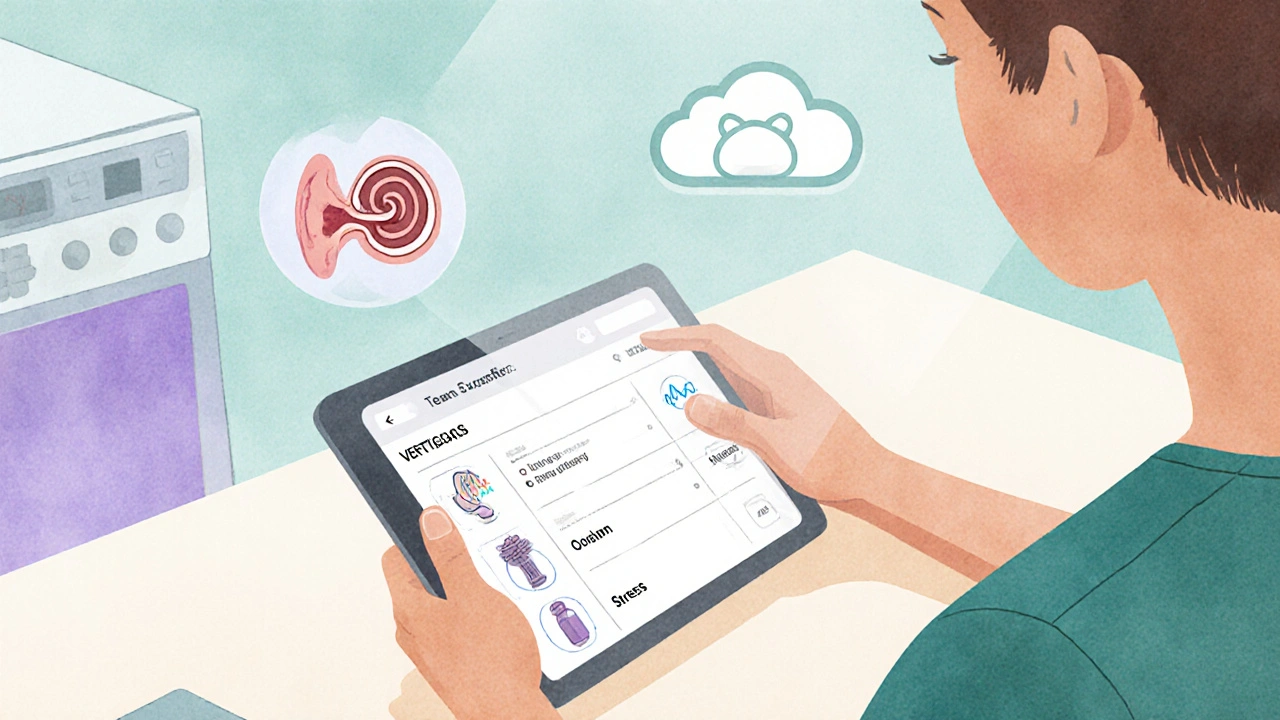Meniere's Disease Care Team Builder
Otolaryngology (ENT) Primary Care
Performs diagnostic tests, prescribes diuretics, and offers surgical options like endolymphatic sac decompression.
Visit Frequency: Every 6-12 months or after flare-upAudiology Hearing
Conducts hearing assessments, fits hearing aids, and monitors changes over time.
Visit Frequency: Annual, or sooner if hearing changesVestibular Rehabilitation Balance
Designs balance exercises that retrain the brain to compensate for unreliable inner-ear signals.
Visit Frequency: Weekly for 4-6 weeks, then monthlyNeurology Medication
Evaluates central causes of dizziness and coordinates medication management (e.g., betahistine, anti-emetics).
Visit Frequency: Every 3-6 monthsDietitian Nutrition
Advises on low-sodium diets, hydration, and caffeine reduction to manage fluid balance.
Visit Frequency: Quarterly, with adjustments as neededPsychology Mental Health
Provides coping strategies for anxiety, which can trigger or worsen episodes.
Visit Frequency: 6-8 weekly sessions, then as needed- Coordinated care speeds up diagnosis and tailors therapy to each symptom pattern
- Patients report better balance and less hearing loss
- Regular communication prevents duplicated tests and conflicting medications
- Early intervention leads to better long-term outcomes
Keep track of your symptoms to share with your care team:
- Vertigo intensity and duration
- Hearing clarity and tinnitus severity
- Dietary habits (especially sodium intake)
- Stress levels and sleep patterns
- Medication changes and side effects
Use a spreadsheet or a mobile app to log your data regularly.
Quick Takeaways
- A team that includes ENT, audiology, vestibular rehab, neurology, and nutrition can lower flare‑ups.
- Coordinated care speeds up diagnosis and tailors therapy to each symptom pattern.
- Patients who follow a multidisciplinary plan report better balance and less hearing loss.
- Regular communication between specialists prevents duplicated tests and conflicting meds.
- Start building your team early - the sooner you act, the easier it is to keep symptoms in check.
What Is Meniere's Disease?
Meniere's disease is a chronic inner‑ear disorder that causes episodic vertigo, fluctuating hearing loss, tinnitus, and a feeling of ear fullness. It affects roughly 0.2% of the population, with most cases appearing between ages 40 and 60. The exact cause remains unclear, but abnormal fluid buildup (endolymphatic hydrops) in the labyrinth is the leading theory. Because the disease attacks multiple sensory systems, a single‑specialist strategy often leaves gaps in care.
Why One Specialist Isn’t Enough
If you or a loved one is dealing with Meniere's disease, a team‑based approach can make a big difference. Vertigo stems from the vestibular system, hearing loss originates in the cochlea, and stress can exacerbate fluid imbalance. Only by addressing each of these angles can you hope to stabilize the condition.
Core Disciplines in a Multidisciplinary Team
Below are the most common specialists and what they bring to the table.
- Otolaryngology (ENT) - Performs diagnostic tests, prescribes diuretics, and offers surgical options like endolymphatic sac decompression.
- Audiology - Conducts hearing assessments, fits hearing aids, and monitors changes over time.
- Vestibular Rehabilitation - Designs balance exercises that retrain the brain to compensate for unreliable inner‑ear signals.
- Neurology - Evaluates central causes of dizziness and coordinates medication management (e.g., betahistine, anti‑emetics).
- Physical Therapy - Works on gait stability, strength, and functional mobility, especially after severe vertigo attacks.
- Dietitian - Advises on low‑sodium diets, hydration, and caffeine reduction to manage fluid balance.
- Psychology - Provides coping strategies for anxiety, which can trigger or worsen episodes.

How Collaboration Improves Outcomes
When these professionals share a patient’s chart, they can pinpoint triggers that a single clinician might miss. For example, an ENT may prescribe a diuretic, but without a dietitian’s low‑sodium plan the medication’s effect can be blunted. Likewise, vestibular rehab can be fine‑tuned after an audiologist documents the exact frequency range of hearing loss.
Studies from 2023‑2024 in Australian tertiary hospitals show that patients managed by a multidisciplinary team experience 30% fewer emergency visits and report a 25% improvement in quality‑of‑life scores (Dizziness Handicap Inventory) compared with those seeing only an ENT.
Practical Steps to Build Your Care Team
- Get a clear diagnosis. Start with an ENT who can order audiograms, vestibular evoked myogenic potentials, and MRI when needed.
- Ask for referrals. Request a referral list that includes an audiologist, vestibular therapist, dietitian, and psychologist.
- Set up a shared record. Many clinics use cloud‑based patient portals that let each specialist add notes. If your providers don’t share a system, ask them to forward summaries after each visit.
- Schedule regular check‑ins. A typical cadence might be:
- ENT: every 6months or after a major flare‑up.
- Audiologist: annually, or sooner if hearing changes.
- Vestibular therapist: weekly for the first 4-6 weeks, then monthly as balance improves.
- Dietitian: quarterly, adjusting sodium intake based on symptom logs.
- Track symptoms. Use a simple spreadsheet or a phone app to log vertigo intensity, hearing clarity, diet, stress levels, and medication changes. Share this log with the whole team.
Common Pitfalls and How to Avoid Them
Pitfall 1 - Ignoring nutrition. Many patients think medication alone will fix fluid overload. A daily sodium intake below 1,500mg (about 3g salt) has been shown to reduce episode frequency by up to 40%.
Pitfall 2 - Over‑reliance on medication. Long‑term diuretics can cause electrolyte imbalance. Regular blood tests ordered by the neurologist keep potassium and magnesium in check.
Pitfall 3 - Forgetting mental health. Anxiety spikes adrenaline, which can worsen endolymphatic pressure. Cognitive‑behavioral therapy (CBT) sessions of 6-8 weeks often lower perceived vertigo intensity.
Comparison of Key Specialists
| Specialist | Primary Role | Typical Intervention | Visit Frequency |
|---|---|---|---|
| Otolaryngology (ENT) | Diagnosis & medical management | Diuretics, steroid injections, surgical options | Every 6‑12 months or after flare‑up |
| Audiology | Hearing assessment & rehabilitation | Hearing aids, cochlear implant evaluation | Annual, or sooner if hearing changes |
| Vestibular Rehabilitation | Balance retraining | Custom exercise program, habituation therapy | Weekly for 4‑6 weeks, then monthly |
| Neurology | Medication oversight & central assessment | Betahistine, anti‑emetics, migraine prophylaxis | Every 3‑6 months |
| Physical Therapy | Functional mobility | Gait training, strength exercises | Bi‑weekly during acute phase |
| Dietitian | Nutrition & fluid balance | Low‑sodium diet plan, hydration strategy | Quarterly, with adjustments as needed |
| Psychology | Mental‑health support | CBT, stress‑reduction techniques | 6‑8 weekly sessions, then as needed |
Next Steps for Patients and Caregivers
1. Write down your most troubling symptoms and any patterns you notice (e.g., salty meals, lack of sleep).
2. Book an initial ENT appointment - bring your symptom log.
3. Ask the ENT to refer you to the other specialists listed above.
4. Set up a shared folder (Google Drive, Dropbox, or your clinic’s portal) where each provider can upload notes.
5. Re‑evaluate every 6 months: adjust medication, tweak diet, and modify rehab exercises based on progress.

Frequently Asked Questions
Can I manage Meniere's disease without a specialist?
Self‑care helps, but because the condition touches hearing, balance, and hormones, a specialist team provides the most comprehensive control. Going solo often leads to missed triggers and repeated vertigo attacks.
How low should my sodium intake be?
Most experts recommend under 1,500mg per day (about 3g of salt). A dietitian can tailor the plan to your lifestyle and ensure you still get enough electrolytes.
Are there surgical options that guarantee relief?
No surgery offers a 100% cure. Procedures like endolymphatic sac decompression or vestibular nerve section can lower attack frequency for many, but risks and benefits must be discussed with an ENT.
What role does stress play?
Stress triggers hormonal changes that can increase inner‑ear fluid pressure. Incorporating CBT, mindfulness, or gentle yoga often reduces both anxiety and vertigo intensity.
How often should I see a vestibular therapist?
Intensive weekly sessions for the first month help reset balance pathways. After noticeable improvement, monthly booster visits keep skills sharp.
Is hearing loss permanent?
Early intervention with hearing aids can preserve residual hearing and improve communication. Some patients experience fluctuating loss that stabilizes after a few years.
Can diet alone cure Meniere's disease?
Diet is a powerful modifier but not a cure. Combined with medication, balance therapy, and mental‑health support, a low‑sodium diet significantly cuts episodes.


I totally understand how confusing Meniere's disease can feel, especially when it hits multiple senses at once.
Having a team that talks to each other really helps keep things straight.
My experience shows that when the ENT and the dietitian coordinate, the salty‑food triggers drop dramatically.
Just keep logging your symptoms and share them, the more data the team has, the better they can tweak treatments.
The article is mostly well‑written, but it mistakenly uses “its” where “it’s” would be correct, which could confuse readers.
Also, the list of specialists could be organized more clearly for better readability.
From a pathophysiological perspective, the multimodal synergistic paradigm elucidated herein aligns with contemporary nosology of endolymphatic hydrops.
Integrating otolaryngologic pharmacotherapy with vestibular neurorehabilitation constitutes a quintessentially holistic protocol.
Moreover, the neurochemical modulation via betahistine exemplifies targeted vestibular attenuation.
Such interdisciplinary orchestration optimizes homeostatic fluid dynamics and neuroplastic compensation.
In essence, the collaborative schema amplifies therapeutic efficacy beyond monodisciplinary limits.
One might argue, with a certain philosophical gravitas, that the very notion of compartmentalizing care into discrete silos is an antiquated artifact of an era that privileged specialization over integration; yet, the empirical data suggest otherwise, for when the ENT, the audiologist, and the dietitian converge, the resultant vector of patient outcomes points decidedly upward, a trajectory that is both statistically significant and clinically meaningful, thereby compelling us to reconceptualize therapeutic frameworks as inherently interdisciplinary, not merely additive.
Honestly, people need to stop ignoring diet, it’s basic health 101 and you can’t fix everything with pills alone.
These guidelines are overly bureaucratic.
Go team! You’ve got this, keep pushing forward!
Looks good but some parts are kinda confusing and the info is not always clear.
Whilst the proposition of a multidisciplinary team appears commendable, one must scrutinise whether such an approach invariably yields superior outcomes across all patient demographics.
It is, perhaps, an overextension of resources in cases where monodisciplinary management suffices.
Nevertheless, the authors have presented a compelling argument for collaborative care.
The structure of the article is logically sound, and the language is clear; however, a few sections could benefit from additional citations to support the claims made.
Furthermore, integrating patient testimonials would enrich the narrative and provide practical insight into the real‑world application of the multidisciplinary model.
When I first learned about Meniere’s disease, I was struck by the sheer complexity of its manifestation, a storm of vertigo, tinnitus, and hearing loss that seemed to defy any single‑discipline remedy.
It quickly became evident that a fragmented approach, where an otolaryngologist prescribes diuretics in isolation, is akin to treating a wildfire with a single bucket of water.
The vestibular system, the auditory pathways, and the autonomic responses are intertwined in a delicate equilibrium that can be tipped by diet, stress, or even subtle hormonal shifts.
Consequently, the inclusion of a dietitian who can calibrate sodium intake is not a mere adjunct but a cornerstone of fluid regulation within the inner ear.
Equally, the psychological dimension, often overlooked, fuels a feedback loop wherein anxiety amplifies vestibular sensitivity, thereby precipitating more attacks.
A neurologist, equipped to monitor medication interactions and assess central contributions, provides a necessary safety net against iatrogenic complications.
Vestibular rehabilitation specialists, with their bespoke exercises, facilitate neuroplastic adaptation, enabling the brain to reinterpret faulty signals and restore balance.
Audiologists, by fine‑tuning hearing aids, not only improve communication but also reduce the cognitive load associated with compensating for fluctuating hearing, which in turn lessens overall stress.
The synergy among these professionals creates a comprehensive therapeutic tapestry, each thread reinforcing the others, ultimately diminishing both frequency and severity of episodes.
Empirical studies from recent Australian cohorts underscore this, revealing a thirty‑percent reduction in emergency department visits for patients managed by integrated teams.
Moreover, quality‑of‑life indices improve markedly, reflecting not just symptom control but enhanced functional capacity in daily activities.
Nonetheless, the success of such a model hinges on effective communication channels; a shared electronic health record or regular multidisciplinary meetings prevent duplicated testing and contradictory recommendations.
Patients themselves must also become active participants, diligently recording symptom logs, dietary habits, and medication effects, thereby furnishing the team with actionable data.
In sum, the multidisciplinary paradigm transforms a bewildering, episodic disorder into a manageable condition, offering hope where solitary care often falls short.
Thus, embracing this collaborative ethos is not merely advisable; it is imperative for optimal patient outcomes.
That was an incredibly thorough breakdown; I appreciate the way you highlighted each specialist’s role and the evidence supporting integrated care.
It really drives home how each piece of the puzzle is essential for stabilizing the condition.
Thanks for shedding light on the practical steps patients can take to engage with their team.
From a cultural standpoint, it’s vital to recognize that patients from diverse backgrounds may have different perceptions of diet and stress, so tailoring the multidisciplinary plan to respect those nuances enhances adherence.
Absolutely, cultural sensitivity can make a huge difference; ensuring that dietary advice aligns with traditional cuisines helps patients stay committed to low‑sodium recommendations.
Wow, this really opened my eyes! 😊 The idea that every specialist adds a piece to the puzzle is so powerful. It makes me want to start logging my symptoms right away. 📊 Knowing that a dietitian can help with salt intake while a therapist handles stress feels like a safety net. 🙏
For anyone building a care team, I recommend setting up a shared online folder where each provider can upload their notes; this simple step streamlines communication and prevents contradictory instructions.
Stop ignoring the glaring grammar errors throughout this post.
Great info! 👍 Just remember to double‑check those sodium numbers – 1500mg is the magic number, not 15000mg 😂